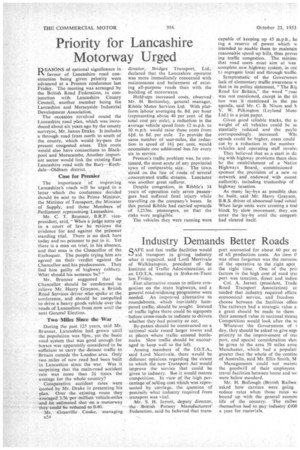Industry Demands Better Roads
Page 58

If you've noticed an error in this article please click here to report it so we can fix it.
CAFE and fast traffic facilities would NJ aid transport in giving industry what' it required, said Lord Merrivale of Walkhampton, president of the Institute of Traffic Administration, at an I.O.T.A. meeting in Stoke-on-Trent last. Friday.
Fast alternative routes to relieve congestion on the main highways, and a general road-widening programme were needed. An improved alternative to roundabouts, which inevitably hampered traffic, should be sought. Instead of traffic lights there could be signposts .before cross-roads to indicate to drivers whether they had priority or not.
By-passes should be constructed on a national scale round larger towns and at places where traffic entered bottlenecks. Slow traffic should beencouraged to keep well to the left.
Among members of the I.O.T.A., said Lord Merrivale, there would be different opinions regarding the extent to which the new Transport Act would improve the service that could be given to industry. But it would restore competition. In view of the high percentage of selling cost which was represented by carriage, the question of precisely what industry required from transport was vital.
Mr. S. H. Jerrett, deputy director, the British Pottery Manufacturers' Federation, said he believed that trans
port accounted for about 60 per cc of all production costs. An item tl was often forgotten was the moveint of the operative to the right spot the right lime. One of the prii factors in the high cost of road tral port was taxation, direct and indire Col. A. Ierrett (president, Trade Road Transport Association) cc tended that industry required efficie economical service, and freedom choose between the facilities offers The railways had a strategic value a a grant should be made to them their assessed value in national stratel Competition would look after the re Whatever the Government of t day, they should be asked to give sup priority to the improvement of tral port, and special consideration shot be given to the area 50 miles arou Manchester, which had a populati greater than'the whole of the contim of Australia, said Mr. Ellis Smith, M Managements could not mainez the goodwill of their employees travel facilities between home and we were below standard.
Mr. H. Bullough (British Railwa. asked how carriers were going reduce rates when those rates wi bound up with the general econtan life of the country. The railwE themselves had to pay industry £100 a year for materials.




































































































